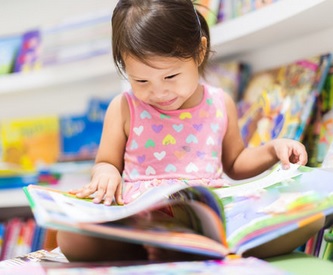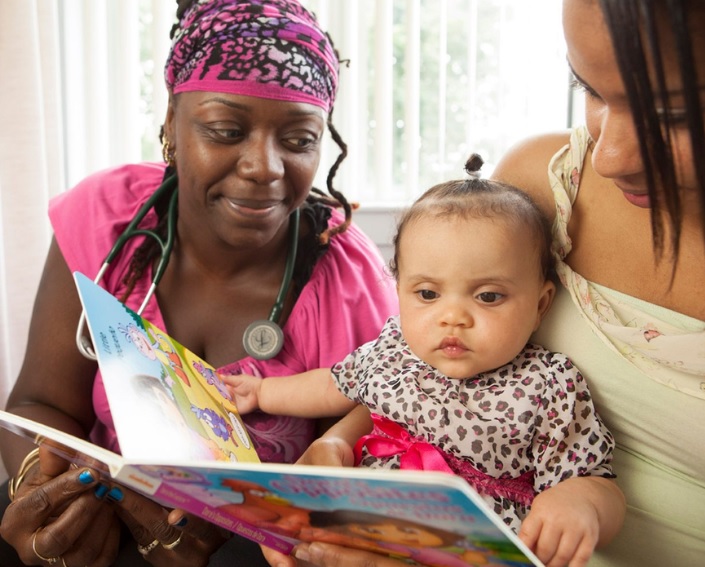 Statistics show that the first five years of life offer a critical window for learning, with rapid brain development that does not occur at any other time. Many children, especially from low-income families, are not read to from birth. Children who grow up without sufficient exposure to language arrive at school without basic literacy skills, and often struggle with reading in early grades.
Statistics show that the first five years of life offer a critical window for learning, with rapid brain development that does not occur at any other time. Many children, especially from low-income families, are not read to from birth. Children who grow up without sufficient exposure to language arrive at school without basic literacy skills, and often struggle with reading in early grades.
For many children, learning to read during the critical first five years of life may be the thing that helps break the cycle of generational poverty and illiteracy.
Reach Out and Read is a national program which prepares America’s youngest children to succeed in school by partnering with doctors to prescribe books and encouraging families to read together. This early-literacy program focuses on children ages 6 months to 5 years old; trains and supports medical providers who give books to children at well-exams; and provides advice to parents about the importance of reading aloud. To visit their website, click here.

Photo from the Reach Out & Read program
Reach Out and Read builds on the unique relationship between parents and medical providers to develop essential early literacy skills in young children via the existing healthcare infrastructure.
Working from that viewpoint, Clinic in the Park buys brand new books that we distribute during community events. Our popular Books-in-a-Bag program has resulted in thousands upon thousands of books being distributed to children to take home and treasure.
The low-income families we support are the very ones who are not able to even consider adding a new book to their shopping cart. Out goal is to provide books for babies and young children as well as school-age kids. At times, parents get in on the action, which is a fun surprise for us to reward their interest in reading by allowing them to select a book or two for themselves. In 2022, we distributed more than 3,000 books!
Why is literacy promotion at pediatric well-child visits important?
- 35% of US children entering kindergarten lack the necessary language skills needed to learn to read.
- Children who live in print-rich environments and who are read to during the first years of life are much more likely to learn to read on schedule.
- Only 48% of parents in the US read to their children daily.
- Preschool language ability is one of the most important predictors of later reading success—research suggests that expressive language vocabulary at age 3 predicts language and reading achievement up to 9-10 years of age.
- Parents of children living in poverty lack the money, background and access to quality books for their children.
 Why Reading Aloud with Your Child is Critical
Why Reading Aloud with Your Child is Critical
- Reading aloud to children is the single most important activity to promote success in reading.
- Preschool language ability is one of the most important predictors of later reading success. This is the age when your child’s brain is developing at a rapid pace, so the stimulation they receive from reading and book-sharing rewards them with lifelong benefits.
- Social and emotional aspects of reading aloud are equally, if not more important, than the language-stimulating benefits. It brings children a sense of security that they can do anything.
How to Help Struggling Readers
For struggling readers, encourage the use of high interest/low difficulty reading materials, such as comic books.
The best way to learn to read is to read widely in the areas of interest. Pre-readers are like the rest of us — they learn best when they can investigate subjects that are interesting & relevant to them. If reading about sea animals, bugs, or race cars are of interest, then lean into that and find books that support those interests. Books with imaginative make-believe stories are also fun and can be a wonderful escape from day-to-day life.
Strategies that Work
- Early exposure to books and reading is one of the best predictors of future school success.
- Reading promotes language & grows vocabulary.
- Mastering language is one of the keys to school readiness.
- Reading aloud is the single-most important activity for building the knowledge required for eventual success in reading.
In other words. . . . . . Read! Read! Read!
For information on the Reach Out & Read program, visit the American Academy of Pediatrics, Orange County webpage by clicking here.
